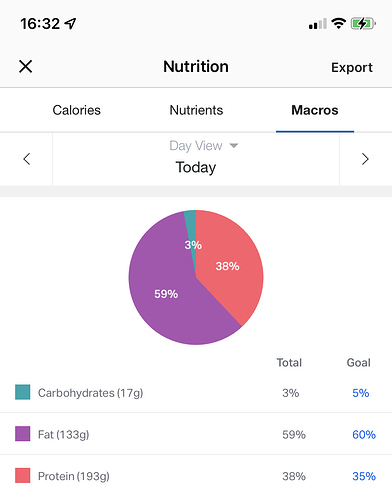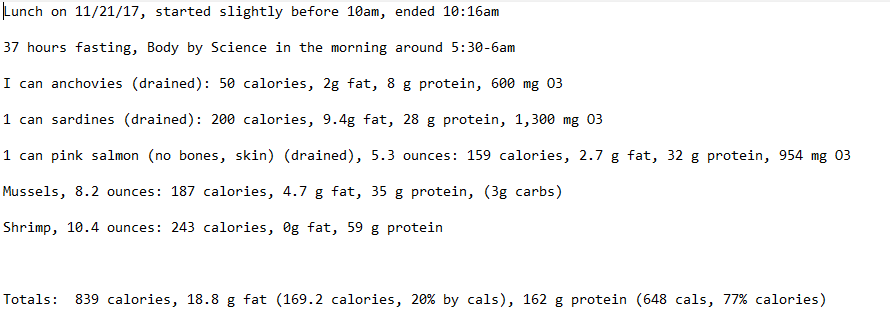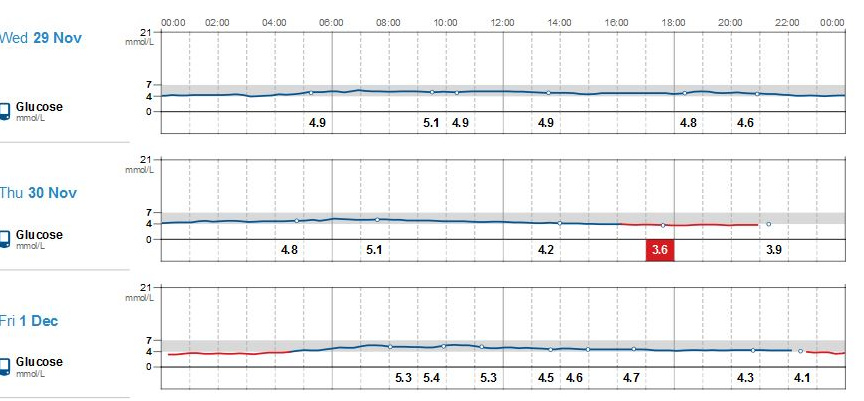As much as you need to avoid feeling hungry. It really is that simple.
How much protein should be consumed in keto diet
Figured since bodybuilding was mentioned early on I’d weigh in.
As a person who is passionate about being an absolute unit, I’d stick to 1g per pound of bw and fill those remaining calories with carbs. At that point if your weight is not doing what you want it to, adjust up or down.
For a non-bber, ketoer, if you’ve got sufficient fats already and you’re at 1g per pound then I’d say it probably doesn’t matter if you up the protein or the fats to meet your caloric balance, whichever you prefer or makes you feel better.
Damn dude, you’re still getting bigger! Congrats! A year ago we were about equal I’d say… You won LOL! I also added carbs back in around my training with an (almost) load once a week and lifts have been going up since then and getting my size back. May have to up it a little more, I know you were taking in more than I am.
So what happens when you REALLY overdose on protein?
I don’t mean going 100% carnivore. I would say that gluconeogenesis does increase with more protein available, but that this is a complicated process that the body will not ‘willingly’ undertake.
@PaulL you will find the PMC paper very interesting in a number of ways! Plus it cites an additional 26 studies most with links. I think this is one of those ‘must read’ papers.
Many people are now revisiting the protein issue
Abstract
…Current data support the hypothesis that the rate of glucose appearance changes but the rate of gluconeogenesis remains remarkably stable in widely varying metabolic conditions in people without diabetes…The mechanism by which gluconeogenesis remains relatively constant, even in the setting of excess substrates, is not known. One interesting speculation is that gluconeogenic substrates substitute for each other depending on availability. Thus, the overall rate is either unaffected or only modestly changed. This requires further confirmation.
Unfortunately, the full paper is behind a paywall.
For the less technical among us:
But it uses the stupid percentage… I eat very very fatty now but no way I want 75% or more fat! And I was very happy at 65% before… While still eating too much fat. Grams are important and individual factors, percentages aren’t that important. That’s good as many of us don’t even know where we are, it’s not like I can track that just measuring everything, I lack data regarding the fat content of my meat.
And it says we should eat lots of protein on keto because protein has less calories per gram… What does it matter? It makes zero sense to me personally. It’s harder to get satiated due to smaller calories density, it’s not always positive… And even the first point about protein being more satiating than fat (that is probably true in general but not always), it’s not always a positive thing. And raising my protein never helped with eating less calories, sadly, it sounded a good idea though. Maybe I am a weirdo.
Keto isn’t even about fat-loss for everyone but even if it is for someone, things aren’t this easy, unfortunately. I don’t say eating more protein isn’t a great tip for many (especially if they eat little to begin with though I don’t understand why they would do that especially on keto. what do they eat then, almost pure fat?)! But using those points to persuade people to eat much protein… it was odd to me.
And some of us do need to tweak our diet to have any chance at losing fat, it’s not just about ratios. (If I want to lose fat, I must eat less protein than now so I eat less fat but I have these stupid connections between my macros. If I eat more of anything, I will eat more fat, it’s almost inevitable. And I eat too much fat to begin with. But it’s my own personal lil problem.)
Remember that food percentages are percentages of calories, not percentages of the weight of the foods. This is a holdover from 150 years ago, when all they could measure was calories, but we seem to be stuck with it. So if you eat 50 g of protein along with 50 g of fat, you are getting 31% protein and 69% fat, because of the relative number of calories they contain.
A gram per bodyweight works well for me. I sometimes don’t make that but generally stay under 20 carbs and about 60% fat 35 % protein.
I’ve been maintaining my weight and have added muscle over the last few years.
I know what calorie percentages are, of course. But they aren’t as important as people so often say. There is no problem with 60% fat on keto if that suits the one in question. I don’t need 2 times as much protein if I eat twice as much anyway…
But then why does protein modified fasting work as I’d anticipate individuals are eating more than 1g protein per lean body mass?
People forget the protein macro is a MINIMUM so you maintain muscle mass while losing fat. Eating more won’t hurt. Most people can’t overeat protein like they can French fries.
Wasn’t it Amy Burger who said that a steak doesn’t instantly turn into cake. And that you don’t need to worry too much about eating a fair amount of protein. So I think the point was not to worry too much about glyconeogenesis.
I believe it was @amwassil that pointed me to this article written by Amy Berger:
It corrected a lot of my misconceptions on how our bodies use protein. Long read but a really good read.
I’m 170lbs give or take 5lbs 10% BF so 74kg LBM or so (all off the top not precise calcs) consuming about 240-300g protein/day No issues. Almost parallel with my fat consumption.
I also don’t worry about protein. I have been eating a lot of “roasts”, like top round, bottom round, eye of round, for lunch. Super easy to make either in an oven or in a sous vide, can add some olives, capers, pickled mushrooms, or leave plain. Makes a nice lunch.
I use about a pound for lunch, this is for top round:
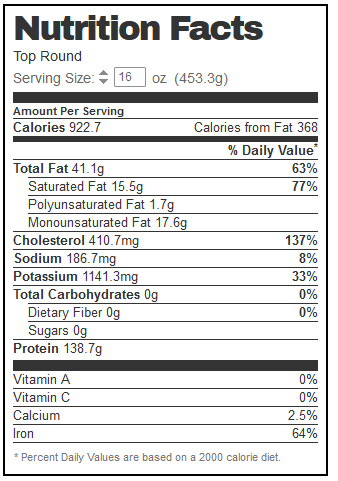
139 grams of protein. Last week, I also added a can of sardines, for another 18 grams I think (the cans are at work, and I’m at home). That’s 156 grams of protein. For my first meal of the day.
Back a few years ago, the wife and I read Jimmy Moore’s Keto Clarity. In it, he recommended eating fat and said that if you’re still hungry, you haven’t eaten enough fat. What I found was that fat never sated me. I could eat as much of it as I wanted.
Then, I bought a year’s supply of a CGM, and attempted to prove that high protein = candy bar. This was my blood sugar after fasting 36 hours, working out that morning, and eating over 160 trams of protein in one meal:
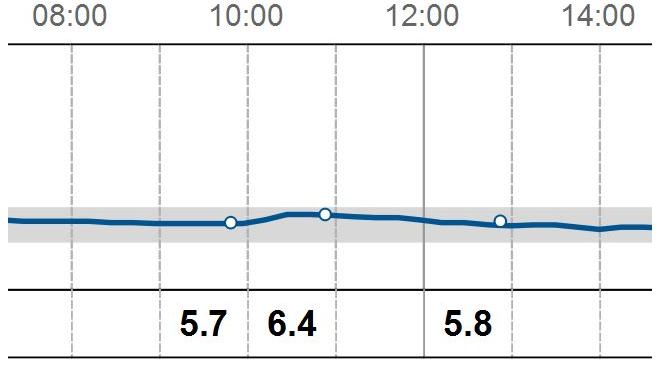
My notes for that meal:
Now, this is potentially a special case, as it was after 36 hours, but what I found was that as long as I ate low carb/keto, my blood sugar was incredibly stable. Here’s a random sampling from 2017:
About a year ago, I tried the Croissant Diet, which is a test to see if saturated fat caused high satiety. While there were times I could get high satiety, if I could pack enough saturated fat into a single meal, I gained over 20 pounds, very quickly. All in my belly. I blew through my size 34 pants, past most of my 36s, and had to even buy some 38s. I found that eating real croissants or 10% fat yogurt plus cacao plus chocolate led to zero satiety. I could eat as much as I wanted. I had to stop myself from eating more.
I’ve gone back to eating (much) higher protein, lower fat, and have lost most of the weight I gained. I’m back into all my 36s, but I’m still outside my 34s. Hope to get there soon, though.
So, for me, fat is detrimental and protein is not.
I 'm thinking this may be genetic, at least in part. I’m going to get a genetic test. Something like this perhaps:
Now, I do think that some people can benefit from a high (animal) fat diet. See Amber O’Hearn and Siobhan Huggins on Twitter, for instance. And I think transitioning from SAD to high fat might not be a bad idea, as protein does have an insulin response.
But I think some (many?) people can limit their fat and increase protein with beneficial effects.

